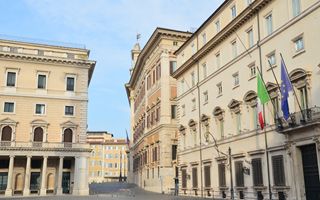(Finance) – Green light from the Council of Ministers, after a meeting that lasted about 40 minutes, allo Draft legislative decree containing “Urgent provisions for the safety and development of infrastructure and transport”the so-called Dl Infrastructures, which deals, among other things, with road concessions, extraordinary commissioners and local public transport. First green light from the Council of Ministers also for the draft legislative decree which, implementing the European Regulation, introduces a national regulatory system on crypto-assets. The decree was approved in preliminary examination and now passes the competent parliamentary commissions which must issue the opinion, before returning to the Council of Ministers for final approval. Furthermore, the law decree for the prevention of seismic risk connected to the bradyseismic phenomenon in the Campi Flegrei area and for civil protection interventions.
Infrastructure law decree
The Infrastructure law decree approved today in the Council of Ministers authorizes the MIT to approve the executive project of the Bridge over the Strait of Messina “also for construction phases”, instead of “by 31 July 2024”, as was initially foreseen in the Bridge decree of March 2023. To determine the update of the contractual value of the work, the Infrastructure decree confirms the provisions of the Stretto decree , i.e. that the ratio between the 2023 and 2021 tariffs must be calculated, but adds the provision “where applicable”.
In the Infrastructure decree also the adoption, by decree of the Prime Minister, of a “plan for rationalization of the tasks and functions attributed to the extraordinary commissioners appointed for the implementation of priority infrastructural interventions”. According to the Ministry of Infrastructure, the objective of this provision is to identify, in analogy with what was done with the “unlock construction sites” decree-law, one or more extraordinary commissioners for the rapid implementation of the Ten-T infrastructure, the trans-European and multimodal transport network, which integrates land, maritime and air transport. The rationalization plan, which must be proposed by the Ministry of Infrastructure, after consulting the Ministry of Economy, must reduce the number of commissioners, assign them further intervention lots or revoke them, “taking into account the results and objectives achieved”, appointing new ones. The Observatory on infrastructural commissioners has been established at the MIT, with a budget of 500 thousand euros per year.
The Infrastructure Decree allocates funds to complete 3 commissioned works: 393 million euros for the Cisterna-Valmontone motorway connection, in Lazio, 150 million for the safety and modernization of the Peschiera aqueduct, which serves Rome, and 20 million for the new headquarters of the Gis (the leather heads of the Carabinieri, of the 1st Carabinieri Parachute Regiment “Tuscania” and of the Pisa Dog Center. For the Po basin, the law decree “defers to 31 December 2024 the terms for the awarding of interventions relating to the safety of existing bridges and the construction of new bridges to replace existing ones with structural safety problems”.
National regulatory system on crypto-assets
The Bank of Italy and Consob are indicated as supervisory authorities regarding the issue, offer and provision of services in crypto-assets. They are granted the powers necessary to carry out their respective functions. The provision also defines the distribution of specific competences between the Authorities and forms of coordination between them. An important aspect is the sanctioning aspect. The legislative decree introduces a regime also providing for criminal sanctions for some cases, for others the sanctioning regime is of an administrative nature. Anyone who issues, offers to the public or requests admission to trading of crypto-assets governed by the European regulation without having the required requisites and authorizations and anyone who carries out services governed by the same regulation in the absence of the authorizations incurs criminal sanctions. The Bank of Italy and Consob, according to their respective competences, are always given the powers to impose sanctions and to impose other administrative measures, including disqualifications, provided for by the European Regulation. The amount of financial penalties, without prejudice to the statutory maximums, provides a minimum of no less than 5 thousand euros for natural persons and 30 thousand euros for legal entities.
